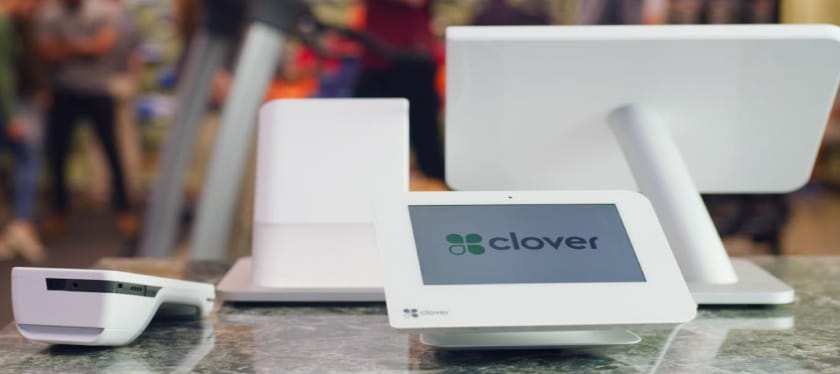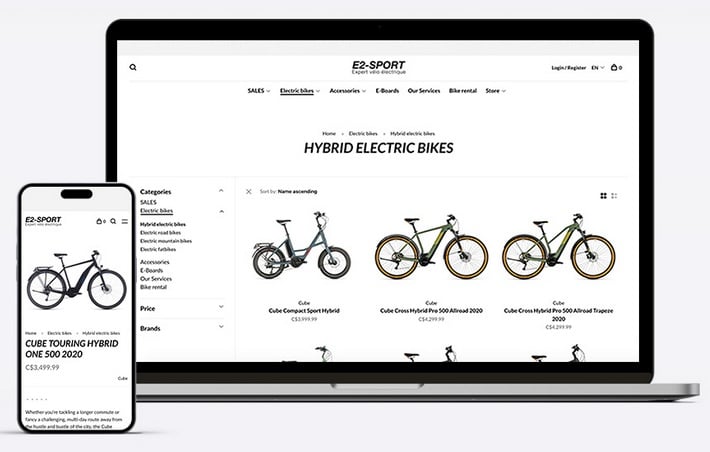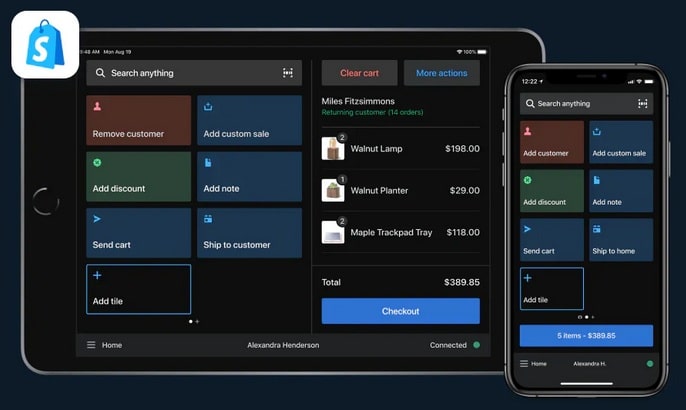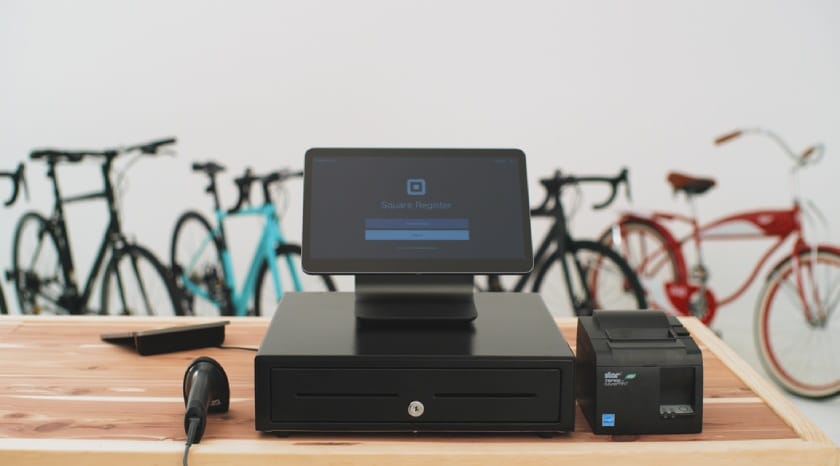The best bike shop point-of-sale (POS) systems have advanced inventory management features to handle a diverse category of items, including parts, warranty tracking, used items, and consignments. They should also be able to manage an array of transaction types, including custom orders, rentals, repairs, and trade-ins.
In addition to these features specific to bike shops, the POS should also have reliable integrated payment processing and business management tools in an affordable package.
The best bike shop POS systems for small businesses are:
- Clover: Best overall and for POS customizations
- Lightspeed Retail: Best for inventory management
- Shopify: Best for omnichannel sales
- Square for Retail: Best for small & startup bike shops
Runners-up (which we’ll discuss more below), which didn’t stand out as much as the options above, but are still decent choices, include:
- Hike: Best POS system for specialty bike shops
- KORONA POS: Best for small bike shops earning regularly from ticket sales
- Retail Edge: Best for bike shops that prefer a locally hosted POS solution
- Alice POS: Best for bike shops that take used bikes
Best Bike Shop POS Systems Compared
Our Score (out of 5) | Monthly Software Fees | Ecommerce Tools | Standout Features | |
|---|---|---|---|---|
4.03 | $13-$225 (Retail) | Optional add-on | Custom orders, Virtual terminal with invoicing | |
 | 3.98 | $89-$339 | Included in all plans | Work orders, Warranties, Rentals |
3.93 | $5-$89 POS subscription | Ecommerce plan for $39-$399 per month | Custom orders, Warranties | |
3.90 | $0-$89 | Square Online for $0-$79 | Free POS, Rentals (integrations) | |
Why You Can Trust Fit Small Business
Clover: Best Overall & Best for POS Customizations

Pros
- Lots of proprietary hardware options
- Compatible with dozens of processors; no fee for use of third-party merchant
- Insights on your sales activities vs your competitors
Cons
- No built-in vendor management tools
- Website builder tools cost extra
- No warranty tracking tools
Overview
Who should use it:
Bike shops that want varied proprietary hardware options, plus software flexibility and customization
Why I like it:
Clover has top-of-the-line proprietary hardware, multilevel inventory management, and integrated payments, among other features. It is also compatible with multiple payment processors and can be programmed to accommodate a variety of workflows and needs.
Although it does not support all bike shop-specific activities by default, bike shop retailers will benefit from Clover’s level of POS customization and the ability to create bespoke workflows.
Based on our evaluation, Clover lost most of its points for its opaque and relatively high pricing and lack of some important bike-shop tools. Additionally, if you need warranty management, look to another POS system such as Lightspeed.
Monthly fees (Retail POS):
- Starter: $13 for 36 months
- Real-time sales tracking
- All payment types
- Employee logins and permissions
- Standard: $170 for 36 months
- Order management
- Detailed sales and tax reports
- Inventory management
- Advanced: $225 per month
- Additional hardware options
Processing rates:
- Card-present: 2.5% + 10 cents to 2.6% + 10 cents (depends on plan)
- Manually keyed-in: 3.5% + 10 cents
- Inventory management: Efficiently handle large volumes of inventory with tools such as bulk editing, enhanced filtering, and multi-location stock transfers. Meanwhile, smart reporting tools can generate demand forecasting. This helps you gain insights into which products are fast-moving, which ones are not getting bought, and what items should be put on sale.
- Ecommerce and omnichannel selling: Clover’s ecommerce features give you a choice between integrating with an existing website or creating your own with its website builder. The omnichannel tools ensure that both your online and in-store sales are synced in real time while also allowing you to offer online ordering, curbside pick-up, and delivery services to your customers.
- Customer-facing loyalty app: Clover’s customer loyalty program is available to all subscription plans. (Compare this to Square and Lightspeed, which charge extra.) It includes a free customer-facing loyalty app that makes for faster purchases, with options for order ahead, auto-pay, and BOPIS transactions.
- Customizations: Clover lets you make some custom configurations when you are setting up your POS system, including choosing a payment processor of your choice, designing your loyalty program, and other custom workflows. Beware though, once your customizations are complete, there is no changing them without opening a new account.

Clover offers several proprietary hardware options bundled into its software plans, which means you’ll be able to sell from the countertop or wherever the customer is. (Source: Clover)
Lightspeed Retail: Best for Inventory Management

Pros
- Customizable matrix inventory in all plans
- Built-in purchase and work order management tools
- Integrated ecommerce tools
Cons
- Advanced ecommerce and loyalty tools require a plan upgrade
- No cancellations or refunds if offline
- Relatively high monthly software fees
Overview
Who should use it:
Bike shops that have diverse, large, or complex inventories; coordinate with many suppliers; and sell online as well as in person
Why I like it:
Lightspeed Retail offers everything a bike shop might need to manage its needs. Lightspeed’s retail POS system offers advanced, customizable matrix inventory management, and the ability to handle rentals, work orders, and regular purchases.
It also comes with built-in consignment, warranty tracking, and purchase order management features. This makes Lightspeed ideal for niche retailers like bike shops handling diverse inventory and sales. It’s also our top pick for the best retail inventory POS systems.
Lightspeed earned excellent marks for bike-specific features and great scores for inventory and sales management tools. However, Lightspeed’s lack of a free plan as well as its high monthly fees and pricing structure, which locks many key features into higher-tier plans, affected its otherwise impressive scores.
POS software plans:
- Basic: $109 per month (annual pricing: $89 per month)
- Inventory management
- Supplier catalogs
- Basic ecommerce
- Core: $179 (annual pricing: $149 per month)
- Omnichannel loyalty
- Advanced reports
- Integrations
- Plus: $339 (annual pricing: $289 per month)
- Custom reports and forecasting
- Custom user and employee roles
- API access
- Payment processing rates: From 2.6% + 10 cents (card-present)
- Hardware: Custom quoted
- Customizable matrix inventory: Lightspeed stands out from the rest with its advanced and customizable matrix inventory available in every plan. This allows you to handle large volumes of inventory with multiple variations, add detailed product descriptions, and create and track custom product codes. This serialized inventory approach lets you track product warranties for every unit.
- Work-order management: Add new customers to your database using Lightspeed’s detailed customer profile. This includes a work order section that allows you to schedule and track repairs or custom-build requests. Square lacks work order management tools.
- Ecommerce tools: A fully integrated basic website builder is available with the baseline Lightspeed plan (upgrade for more functionality). It comes with mobile-responsive themes, and SEO and marketing tools. Omnichannel features sync your ecommerce and storefront data, allowing you to offer buy online, pick up in-store (BOPIS) options and track inventory levels in real time. However, Shopify’s ecommerce tool is more robust.
- Reporting and analytics: Lightspeed’s reporting tool comes with over 50 customizable, built-in reports—the most out of the POS systems on our list. Advanced analytics features include identifying key factors for sales performance and making actionable tips, such as suggesting stock reorders and staffing levels.
- Rentals management: Create inventory that you can rent out to customers. Lightspeed includes native rental tools where you create rental inventory, set a rental duration, track rented items, create quotes with your rentals, and ensure your items are returned.

Manage your bike shop and sell from any device, sync your physical and online inventories, and manage inventory and purchase orders with Lightspeed Retail. (Source: Lightspeed)
Shopify: Best for Omnichannel Sales

Pros
- Best-in-class omnichannel solution
- Able to handle rentals
- Wide range of payment options, apps
Cons
- No offline payment processing
- Limited inventory in basic plan
- Many tools available only via third-party apps; extra fees
Overview
Who should use it:
Bike shops that primarily sell online, but also offer pickup in-store or curbside options
Why I like it:
As the leading ecommerce and omnichannel platform, Shopify POS is ideal for bike shops that primarily sell online. It also includes customizable inventory functions that can manage large product quantities with multiple variants. Shopify even has tools for offering wholesale pricing if your bike shop sells parts or full bikes to other retailers. Shopify occupies a unique niche in our roundup of best POS systems for bike shops.
However, factors such as the lack of a free plan and offline payment processing prevented Shopify from landing higher in our rankings. It also depends heavily on upgrades and integrations for bike shop features like consignment management and warranty tracking, which can incur additional fees.
- Shopify ecommerce plans:
- Basic ($39 per month): Online store, 24/7 support, social selling, discount codes, abandoned cart recovery, gift cards, marketing automation, international market management (including language and payment),
- Shopify ($105 per month): Basic plus special shipping pricing and insurance, and ecommerce automations
- Advanced ($399 per month): Shopify plus third-party calculated shipping rates, and duties and import tax estimates
- Shopify POS Plans:
- Lite POS ($5 per month): Free to use in all ecommerce plans (cannot use without ecommerce plan); basic POS tools (transactions, inventory, CRM)
- POS Pro: $89 per month, per location, or free for enterprise users under the Shopify Plus plan. Can be purchased as a stand-alone product. Includes basic POS tools plus scalable to 1,000 locations, unlimited staff, smart inventory management, in-store analytics, and more
- Hardware costs:
- Bundles: Contact sales; prices start from $219
- Shopify POS Go handheld: $399
- Shopify card readers: From $49
- Processing fees:
- In-person: 2.4% + 10 cents – 2.6% + 10 cents, depending on plan
- Online: 2.5% + 30 cents – 2.9% + 30 cents, depending on plan
- Use a third-party payment processor: add 0.5% to 2%, depending on plan
- Smart inventory management: Like other advanced inventory management tools in this roundup, Shopify’s smart inventory management feature allows you to create unlimited products with multiple variants, but also lets you track warranties with the metafield function, which most of the POS I considered lacked. It automatically adjusts inventory levels for every online and storefront transaction. You can set low stock limits for each and create a workflow to reorder through the purchase order management feature.
- Omnichannel tools: Shopify’s advanced omnichannel tools allow your customers to purchase online and receive their products either via delivery or curbside/in-store pick-up. Alternatively, you can have customers browse in-store and complete their purchases on your website. Shopify is the only one on our list that also offers deep shipping discounts.
- Seamless checkout process: Both Shopify’s mobile and desktop apps are quick to learn and easy to use. Like Square for Retail, you can also customize your dashboard with hotkeys, tiles, and menus to help improve your checkout workflow.
- Reporting and analytics: Each subscription level has access to different reporting tools. The basic Shopify plan includes basic report functions such as generating standard reports for cash flow, sales, and inventory levels. More features are unlocked as you upgrade your plan. The Stocky App is available for Shopify Pro users—this includes insights into sales, cost of goods sold, inventory analysis, demand forecasting, and sale item suggestions.

Shopify is designed primarily for online sales, and has an intuitive, customizable interface you can access on any device. (Source: Shopify)
Square for Retail: Best for Small & Startup Bike Shops

Pros
- Free plan including online store and basic features
- Affordable upgrades with advanced inventory and reporting tools
- Integrated customer financing for in-store and online with Afterpay
Cons
- Limited or inconsistent customer support
- Limited inventory tools in free plan
- Minimal bike-shop-specific tools (rentals, repairs, parts)
Overview
Who should use it:
Smaller or startup bike shops that just need the basics—sales, inventory, marketing, CRM, and online selling
Why I like it:
Square for Retail is our top-recommended retail POS system and its standard POS, Square, is constantly our top pick for the best small business POS system and the best free POS system across industries. It offers a forever-free subscription, a simple and intuitive user interface, extensive online help resources, and robust reliable POS tools.
Square earned impressive marks for its register features while also getting a high score in pricing for offering a free plan, free hardware (card reader), and a lower midrange subscription fee.
Despite its accolades, Square lacks some of the bike shop-specific tools some businesses need. This includes work order management, rental management, repairs, or consignment tools. However, you can use third-party integrations to get many of the bike shop-specific tools it lacks in-house. Square also offers excellent add-ons, including payroll, but Lightspeed beats it for consignment, warranty, and work order management.
POS software plans:
- Free ($0)
- Basic inventory management
- Online selling
- Invoices, gift cards, and refunds
- Plus ($89 per month)
- Advanced inventory management
- Cross-location returns
- Advanced reports
- Premium (Custom pricing)
- Custom pricing and processing rates
- Hardware costs:
- Square Stand: $149 (iPad not included)
- Square Terminal: $299
- Square Register: $799
- Card readers: $10-$59
- Square Payments processing fees:
- In-person: 2.5% + 10 cents to 2.6% + 10 cents (lower rates with Plus plan)
- Online: 2.9% + 30 cents
- Invoices: 3.3% + 30 cents
- AfterPay (Buy Now Pay Later): 6% + 30 cents per transaction
- Volume discounts: Available for businesses processing over $250,000 annually
- Built-in integrated ecommerce tools: Square’s ecommerce and omnichannel tools are available to all subscription plans, including the free plan. All online orders will also automatically appear on your dashboard. Get alerts for online sales (particularly useful for in-store or curbside pickups) on your POS terminal.
- Inventory management: Square’s inventory management feature provides more control, such as inventory counting, stock forecasting, COGS tracking, vendor/purchase order management, and bulk updating. Its customizable catalogs include categories, variants, and modifiers. While it lacks some inventory tools that Lightspeed has, it’s in-depth and easy to use.
- Affordable proprietary hardware: With Square, users have a choice between running on iPads or countertop registers, with mobile card readers and handheld terminals for added mobile options. Each hardware option is equipped with swipe, chip, and NFC payment technology and can be purchased in low installment plans.
- Integrated customer financing: Bikes and all their accessories are expensive, but Square can help you drive sales even on big purchases with their Afterpay integration. With this pre-integrated tool, you can offer your customers financing options for both in-store and online purchases.

Square offers many hardware options, including full countertop kits that work well in a bike shop. (Source: Square)
Bike Shop POS Runners-up
While they did not make our list of the very best, these providers also offer noteworthy bike-shop POS systems:
Hike: Best Specialty Bike Store POS System
Hike is specifically designed for bike shops and comes with all the tools to support its unique inventory and sales requirements, such as custom orders, rentals, repairs, and consignment management. It scored high marks for bike shop-specific functionality. Most of its inventory management and work order management features will require a plan upgrade, and while it does offer integrated payments, Hike users will be subjected to the terms and conditions of its payment processing partners.
KORONA POS: Best for Small Bike Shops Earning Regularly From Ticket Sales
KORONA comes with a built-in ticket sales feature and affordable subscriptions. This makes KORONA a good fit for bike shops that host regular events like group rides. However, most bike shop-specific and management features require an upgrade to a higher plan. The lack of necessary features in KORONA’s base plan prevented it from making our list. However, generally speaking, KORONA’s pricing is affordable, with its most expensive plan costing $89 per month.
Retail Edge: Best for Bike Shops That Prefer a Locally Hosted POS Solution
Retail Edge is a non-cloud-based POS that’s ideal for bike shop owners who are more comfortable with their data stored in-house. However, this standalone POS is only compatible with Windows OS and will require you to purchase a license outright. Client support is also available for a monthly fee. Even so, real-world users give it an average score of 4.77 out of 5—the highest user rating on our list.
Alice POS: Best for Bike Shops That Take Used Bikes
Alice lacks some of the advanced POS tools I looked for. However, I was impressed with the features it offers for handling used inventory. Consignments, marking used items, buy-backs, and trade-ins are all standard in every POS system. Many on our list have workarounds for these tools.
How I Evaluated Bike Shop POS
For this buyer’s guide, I prioritized POS systems that can support bike-shop-specific activities while providing the best value for money. Aside from the general business management features, I considered inventory, customer, and sales management tools that fit in with the unique requirements of bike retailers. Other key factors that affected our evaluations include payment processing options, reporting and accounting tools, customer support hours, and ease of use.
Click through the tabs below for our in-depth evaluation criteria:
25% of Overall Score
15% of Overall Score
15% of Overall Score
Advanced inventory management features take a big slice of the score for this category. We then considered the system’s ability to handle purchase orders and stock counts. Other features included in this section are CRM tools, reporting functions, employee, omnichannel, and invoice management. Lightspeed took the lead with 4.63 out of 5.
25% of Overall Score
This section lists the different bike-shop-specific activities, like rentals, used inventory, consignments, warranties, and even event ticket sales for bike tours. We also awarded extra points for systems that include bike shop third-party integrations. Lightspeed led with 4.75, while Square had the lowest score with 2.5 out of 5.
10% of Overall Score
We wanted to emphasize that systems, while ideally advanced, should also be easy to use. Easy installation, touch-screen function, supported with detailed training materials, and 24/7 customer support are the key factors in this category. We also recognized systems that are cloud-based and offer hybrid installation or an offline mode. Square and Clover tied here with 4.38 out of 5; Clover has better service hours, while Square has better online learning tools.
10% of Overall Score
Finally, we evaluated each system’s overall performance against its comprehensive feature set. We also considered value for money, popularity, user reviews, and the overall experience of navigating the system’s interface. Shopify earned a perfect score.
Bottom Line
Investing in a strong point-of-sale system that can meet the needs of your bike shop can help reduce time spent at the till, doing inventory, and reaching out to customers. This can improve your bottom line. Our roundup includes alternatives that suit bike shop businesses of all sizes and with tools that can match every possible revenue stream for bike retailers.
Clover is our most recommended solution, offering bike shops a range of pricing plans and proprietary hardware that can scale with your business as it grows. Visit Clover for a free trial.